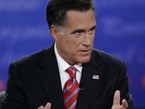The key to understanding Governor Mitt Romney’s victory in the third and final presidential debate is to look at how the positions he took matched the preferences of voters in certain swing states. As Breitbart News noted yesterday, several swing states have constituencies with particular interests in foreign policy. While President Barack Obama seemed to want to create an overall impression of strength, Romney subtly hit the key points.
Here is how the candidates matched up to the criteria laid out for each swing state where foreign policy counts:
1. Florida
Yesterday:
Large Cuban and Jewish populations in the state make Floridians eager to hear the candidates take a tough stand against Fidel Castro’s allies and in support of Israel. Florida also has more aerospace and defense industry employees than any other swing state. Obama’s soft approach to leftist leaders in Latin America, his poor record on Israel, and his defense cuts (including at NASA) have hurt him here.
Tonight:
Both candidates spoke about their support for Israel. But only Romney discussed Cuba specifically, and Latin America generally, citing Obama’s weakness on the former and lack of interest in the latter. Romney also focused on Obama’s defense cuts, which Obama defended weakly by comparing the U.S. Navy to horses and bayonets.
2. Virginia
Yesterday:
Defense looms large in Virginia, which has a long military tradition and ranks in the top ten states for aerospace and defense employment. Mitt Romney chose to re-launch his foreign policy here, at the Virginia Military Institute. His argument for a strong military and his criticisms of President Barack Obama’s recent failures in Libya have helped him take a small lead in some recent polls.
Tonight:
Romney decided to play it cool on Libya while making a broader critique of the direction of foreign policy under Obama. He did well to defend defense spending, and Obama’s bizarre bayonet comment may actually have hurt him badly in key areas of Virginia, especially the shipbuilding community of Hampton Roads.
3. Pennsylvania
Yesterday:
Pennsylvania is a fairly large defense industry employer, but the main foreign affairs issue may be Israel. Though only 2.3% of the state’s population is Jewish, those votes are concentrated in the Philadelphia suburbs where Romney is giving Democrats a challenge for the first time in decades. Democrats were worried enough to send Debbie Wasserman Schultz to an area synagogue in July.
Tonight:
Both candidates did well on Israel tonight, though Romney was far stronger on the issue of Iran, which may result in an edge among those pro-Israel voters who see Iran as the most important aspect of the issue. Obama’s recollection of his visit, as a candidate, to Israel may have helped shore up flagging support.
4. Ohio
Yesterday:
Like other Great Lakes states, Ohio benefits from free trade, but it has suffered acutely from foreign manufacturing competition. So China is a critical foreign policy issue in Ohio, which is why both Romney and Obama have focused on it. Frustration with Obama’s policies on Israel and the Middle East more generally has given Josh Mandel (R) an opportunity in his race against incumbent Sherrod Brown (D).
Tonight:
Romney’s argument on China was far stronger than Obama’s–in fact, it was likely the best moment in the debate for him. His repeated attacks on the general direction of Middle East policy may have helped as well. Obama tried to hit Romney for his opposition to the auto bailout, but as in the second debate, Romney pushed back hard on that issue, fact-checking Obama and looking far more confident in his position.
5. Michigan
Yesterday:
Voters in Michigan care about China for many of the same reasons voters in Ohio do. One distinction in Michigan is the state’s large Arab minority, which has often backed candidates who are tougher on Israel. That may give Obama an edge and may cause Romney to temper some of his remarks. Despite his apparent skepticism of a Palestinian state, for example, Romney supports one as a policy goal.
Tonight:
Again, Romney’s position on China helped him here–and Romney may have even helped himself among Arab-American voters by bringing up the Israeli-Palestinian peace process, something Obama ignored completely.
6. Wisconsin
Yesterday:
Though Wisconsin is more well-known as a battleground over labor policy than foreign policy, Iran has become an issue in the open-seat Senate race between Tommy Thompson (R) and Tammy Baldwin (D). Like Sherrod Brown in Ohio, Baldwin has aligned with the far-left J Street organization, which is critical of Israel. She also was one of a few of Democrats to vote against some Iran sanctions.
Tonight:
Romney’s focus on Iran went to the heart of the J Street issue and likely helped him, and Thompson.
7. New Hampshire
Yesterday:
If you live in Colebrook, you might be able to see Canada from your house. But if you live on the other side of the state, you might work for one of the state’s defense companies, or you commute in your Prius to an aerospace job in Massachusetts. Concern about looming defense “sequester” cuts may be helping to make the state more competitive than it has been in months.
Tonight:
Romney’s focus on defense cuts and the sequester–and Obama’s obtuse, at times arrogant responses–were likely what the state’s defense voters wanted to hear, and could help him carry his momentum forward.
In sum, Romney’s messages at the Third Presidential Debate tonight targeted exactly the constituencies he needed to reach in swing states. While some post-debate polls may have shown Obama with an edge–no doubt reflecting enthusiasm among blue-state or urban voters for Obama’s more aggressive performance–Romney’s targeted endorsement of positions of interest to those few voters who care about foreign policy was well executed, and will likely build his momentum in swing state polls in the days left before the election.

COMMENTS
Please let us know if you're having issues with commenting.